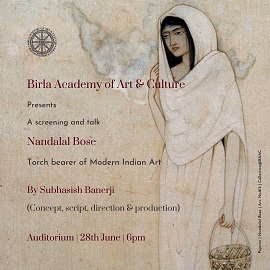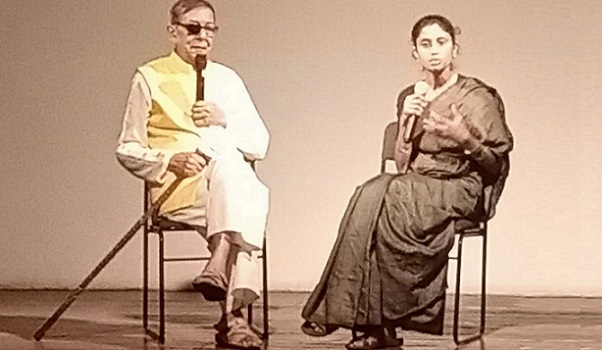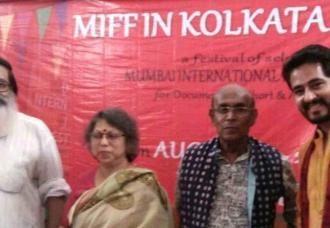An octogenarian raised Rs 70,000/- through crowd funding to make this documentary film on Master Moshai, Nandalal Bose. His friend Kunal gave voice to the commentary. The visuals have been painstakingly put together from multiple sources. And then, Subhashis Banerji simply uploaded the film on YouTube.
 Going to CBFC? Sending it for the National Film Awards, which have a segment on films on Art? Or the various festivals of short films and documentaries that dot the calendar? No. Because It’s a labour of love for the engineer turned director who is the great grandson of Asit Haldar — the artist who had shadowed Nandalal Bose on his journey through art. He says, “I have made it, and I am happy that I could make it when the state government, Visva Bharati University — no one was willing to trust me with the job.”
Going to CBFC? Sending it for the National Film Awards, which have a segment on films on Art? Or the various festivals of short films and documentaries that dot the calendar? No. Because It’s a labour of love for the engineer turned director who is the great grandson of Asit Haldar — the artist who had shadowed Nandalal Bose on his journey through art. He says, “I have made it, and I am happy that I could make it when the state government, Visva Bharati University — no one was willing to trust me with the job.”
The end titles acknowledges the help he has received from Sushobhan Adhikary , K Shiva Kumar, and Sisir Sahana. Perhaps we can look forward to another help: from Chiranjit. The actor who is trained in art not only sat through the film but applauded it too.
Nandalal Bose (1882-1966) was a pivotal figure in the annals of Indian art, particularly noted for his significant contributions during the nationalist movement under British colonial rule. Aligned closely with the Bengal School of Art, Bose’s oeuvre embodies a synthesis of traditional Indian art forms, drawing inspiration from the Mughal and Rajput styles as well as indigenous folk traditions. His artistic philosophy, deeply rooted in the ethos of the Bengal School and shaped by his mentorship under Abanindranath Tagore, underscores his commitment to revitalizing indigenous artistic expressions.
Bose’s artistic repertoire encompassed a diverse range of subjects, including mythological narratives, historical themes, and evocative landscapes. His works are distinguished by a unique fusion of Indian cultural motifs with modernist sensibilities, reflecting his mastery of form and technique. Beyond his artistic achievements, Bose assumed a pivotal role in art education and administration. Notably, he served as the principal of Kala Bhavan, the renowned art school at Visva-Bharati University established by Rabindranath Tagore in Santiniketan.
In scholarly discourse, Bose remains celebrated for his enduring impact on modern Indian painting and his role in shaping the trajectory of nationalist art movements. His legacy continues to resonate as a testament to the power of art in fostering cultural identity and resilience amidst colonial hegemony.





